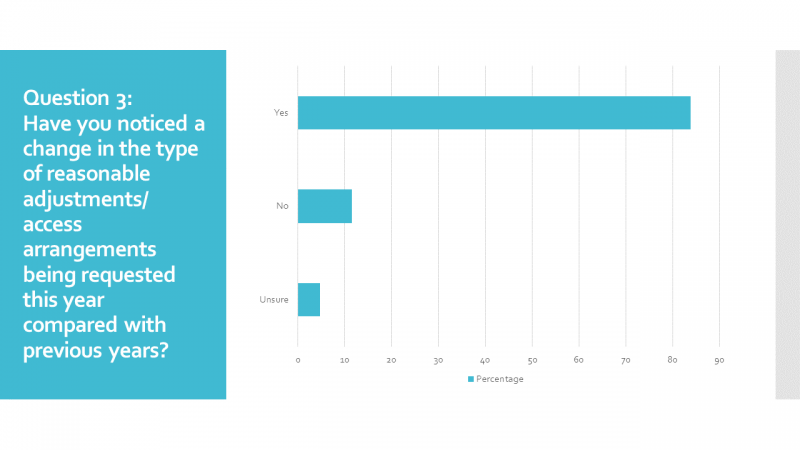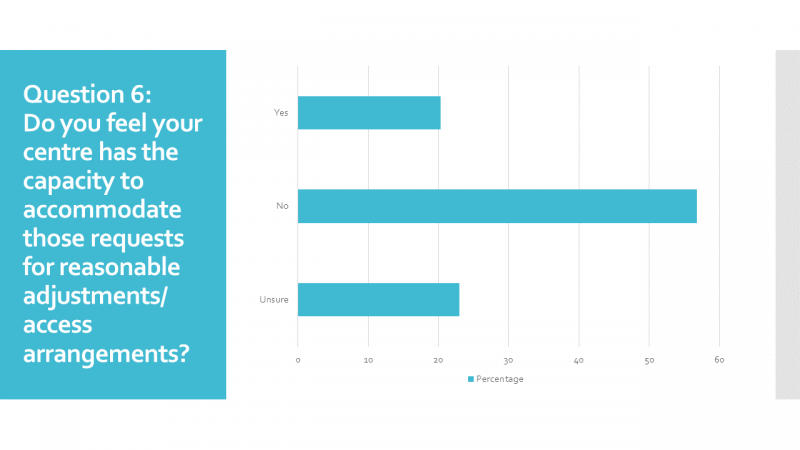One of Communicate-ed’s primary aims is to support SEN Professionals to do their jobs well, particularly in the field of Access Arrangements, so we ran a survey of our members and subscribers to assess what impact the pandemic may have had on Access Arrangement and Reasonable Adjustment requests. We are grateful to all those who took the time to fill in the survey and share their experience and opinions; below is a summary of our findings for all who are interested. We have shared the anonymous data with Ofqual and DfE for their consideration.

As you can see from the chart, 84.5% of respondents reported an increase in demand for access arrangements and reasonable adjustments compared to previous years. When asked about the level of increase, there were a wide range of answers given between 5% and 100% increase. The average was about a 30% increase in the number of referrals for assessment for access arrangements. Some of the highest reported increases were in FE settings where students in Y13 are still yet to have taken a public exam, and where many are re-sitting GCSEs. Many participants mentioned a significant increase in parent requests for AAs (as well as increased student and teacher requests).

A similarly high percentage of respondents reported a change in type of access arrangement requests compared to previous years. When asked which arrangements are more in demand now, there was a very high level of consistency in answers, naming four main arrangements:
Readers (and read aloud) were also mentioned, as were Scribes, but to a lesser degree.
We asked respondents to suggest why they thought demand for these arrangements had increased. There were a wide range of insightful answers given yet there was a lot of consistency and agreement within these.
It was widely felt that the increase in generalised anxiety and other mental health conditions including ADHD and Tic disorders accounted for the increase in demand for separate invigilation. Most participants attributed this to the pandemic and reduced face to face input at school. It was acknowledged that students weren’t used to working around lots of people for much of the last 2 years, and many have never sat a public exam.
Participants acknowledged there were probably several different factors driving the increase in demand for extra time. Many suggested that during lockdowns, parents witnessed their children struggling with learning for the first time, leading them to push for a diagnosis of difficulty or extra time. Some felt that lack of exam experience means students are not used to the timing requirements of exams, and that lack of handwritten work over the last two years has impacted speed of handwriting. Some attributed increased teacher requests for extra time to the teacher’s fear of grades dropping. Several respondents reported that parents often feel that if their child has a diagnosis for anything, they should be entitled to extra time. In Further Education, it was noted that students with weaker literacy skills have got onto courses they may not have done previously due to some grade inflation, or even centres’ desire to make courses viable through adequate numbers, leading to reader and extra time requests when students are unable to work at the level of the course.
This increase in demand for using a word processor in exams was attributed to the fact that many students and parents feel this has been their normal way of working (NWOW) for much of the last two years, so they should be entitled to it in exams. There was also a sense that handwriting has become slower or poorer where not used as much. Interestingly, one respondent reported that the increase noted in their centre in students wanting to use word processors had now gone down again; several trialled it as their NWOW and have chosen to go back to writing by hand.

The increase in demand for rest breaks was again attributed to the marked rise in anxiety and other mental health conditions. Many people reported an increase in the diagnosis and self-diagnosis of ADHD among students. A lot of respondents commented that students haven’t been used to working and focussing for long periods of time over the pandemic, often taking regular breaks at home, leading to problems with sustaining focus and attention. While the pandemic will also have played a part in this, it was acknowledged that technology, mobile phones and social media may also be contributing factors.
Other repeated threads in answer to why there has been an increase in demand included:

Over half of participants felt that their centre would not have capacity to accommodate all the requests received for access arrangements and reasonable adjustments. There was a lot of agreement on where the challenges lie:
A majority of participants cited a lack of space and separate rooms to accommodate all separate invigilation requests.
It was widely acknowledged that the requested arrangements require more invigilators and exam helpers, and participants were concerned they had insufficient staffing to meet the need.
A lot of respondents suggested they simply didn’t have enough laptops to accommodate all the word processor requests.

Many participants expressed being overwhelmed by the time needed to process the number of access arrangement requests received, as well as the time needed to administrate the outworking of these during exams, on top of already busy roles.
Another challenge that was repeatedly mentioned, though less related to capacity, was communication with parents. The difficulties of external reports recommending access arrangements for which the school has no JCQ evidence for were expressed by several respondents. The time and emotional energy cost of disagreement with parents is significant.
In Further Education, the increased rigour requiring two low scores on Part 2 of Form 8 meant there has been a need to reassess students who previously were allowed extra time but only had a low standardised score for one area of processing. This, together with the fact that some students missed being at GCSE by their secondary school, has contributed to a considerable rise in assessment numbers for FE centres this year.
Looking at the data, it’s relatively easy to acknowledge that there’s a significant increase in demand for access arrangements this year, and to name the associated challenges, but we’d love to be able to do more than that.
We have shared our (anonymous) findings with Ofqual and the DfE, who have welcomed the information and are aware of the issues.
Bottom line, if you’re experiencing the challenges described by our survey participants, you are not alone. The high degree of consistency in our survey responses suggests that SEN teams in schools all over the country are facing similar situations.
We’d love to hear how your centre is meeting some of these challenges. If we’ve learned anything about working with SEN Professionals over the last 20 years, it’s that they are a highly creative, compassionate and conscientious bunch of people, and we are constantly encouraged by the amount of support we see our members give each other through our discussion forums. If you or your centre have ideas or methods to help process or accommodate the number and type of access arrangement requests received this year, then we would love to hear about these and give you a platform to share that good practice.
Please email katie at communicate-ed dot org dot uk with anything you’d like to share.
For example:
Finally, while there’s no magic solution to any of the challenges described in this article, we just wanted to remind you that you are doing an invaluable job. Facilitating students to access their exams on a level playing field helps enable them to reach their full potential. Evaluating applications honestly and having difficult conversations when necessary upholds the integrity of the public exam process. So well done for persevering in a challenging time - we see you.
Do get in touch with your ideas, or let us know if you think of any other ways Communicate-ed could support SEN Professionals in their role this year.